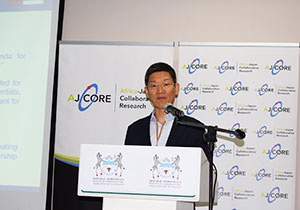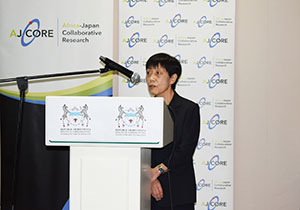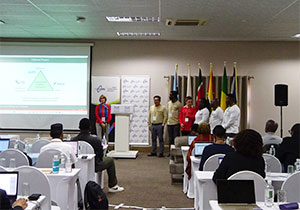News & Topics
AJ-CORE Researchers’ Joint Workshop in Maun, Botswana, April 16–18, 2024
Strategic International Collaborative Research Program (SICORP)
https://www.jst.go.jp/inter/english/program_e/multilateral_e/aj-core.html
The Africa–Japan Collaborative Research (AJ-CORE), under the Strategic International Collaborative Research Program (SICORP), is supporting research projects by the consortia of researchers from Japan, South Africa, and at least one African country participating in Africa’s Science Granting Councils Initiative (SGCI)*. It aims to resolve issues important to Africa and the world, including the Sustainable Development Goals (SDGs). Three joint Calls for Proposals in the field of “Environmental Science” have been conducted so far, and the 4th Call for Proposals is underway in 2024.
The AJ-CORE Researchers’ Joint Workshop was held in Maun, Botswana, between 16th and 18th of April 2024, with approximately 100 participants, comprising project members, Program Officer, representatives of funding agencies, and government officials. Botswana Ministry of Communications, Knowledge and Technology (MCKT) hosted the workshop, in partnership with the Japan Science and Technology Agency (JST) and the National Research Foundation (NRF) of South Africa.
Taking this opportunity, the AJ-CORE booklet was published. This is an excellent source of information collating the achievements, impact stories, and concepts of all the 13 AJ-CORE funded projects.
- The booklet is available from the following link:
- https://www.nrf.ac.za/wp-content/uploads/2024/06/2024-AJ-Core-Publication-Copyright.pdf
The workshop was officially initiated by the MCKT Permanent Secretary, Mr. Pontsho C. Pusoetsile, followed by Dr. Prudence Makhura of NRF South Africa, to explain about SGCI and provide an outline of AJ-CORE in the SGCI context. Subsequently, Mr. Osamu Kobayashi, Director, Department of International Affairs, JST, explained how AJ-CORE was established with the concept “STI for SDGs” through the equal partnership of Japan and African countries, from its inception back in the Japan–African joint workshop (2018) and TICAD7 (2019), as well as its adopted research projects that contribute to resolving regional common challenges. Furthermore, Dr. Chieko Umetsu, AJ-CORE Program Officer in Japan and Professor Emeritus at Kyoto University, shed light on the uniqueness of AJ-CORE program, which is conducted by the consortia of researchers with diverse backgrounds, and the engagement of various stakeholders from earlier stages for smoother social implementation. Moreover, she expressed her expectation for great potential of further innovation by fostering cross-project collaborations under the broad theme in the “Environmental Science” field.
Subsequently, researchers of all the adopted projects from the first to third Calls of Proposals explained their project plans and findings, leading to various questions and active discussions with other participants.
Furthermore, we held a brainstorming session to discuss ideas for generating further innovation through cross-project collaborations, as well as a researcher training for using open science platform and preparing policy briefs to maximize the research outputs.
AJ-CORE program will periodically organize such joint workshops to enhance the high-level support for research activities to resolve social challenges in Africa.
*SGCI (Science Granting Councils Initiative): An initiative by the science granting councils in 17 sub-Saharan countries to strengthen the capacities of these granting councils to support research, research management, evidence-based policymaking, etc.
https://sgciafrica.org/

Group photo of participants

Mr. Kobayashi, JST

Dr. Umetsu, Program Officer

Presentation by project team
